Day 1: Halle (Germany) → Vienna
It was 2005 and I was about to move to Japan - maybe for 10 years, maybe for good - I didn't know (and still don't know). But I had some unfinished business in Europe - and that was, to travel the wild land of the Shquipetars, better known as Albania. I was sure that Albania wouldn't run away, but it's for sure easier to go to Albania from Germany then from Japan. Unfortunately, my beloved wife couldn't join me on this trip, and so started alone. Because of that and the fact that I had still much work to do, the trip was limited to 10 days only this time.
So, how to get there? By plane, it would set me back around € 300. Call it ambition, but I finally opted for travelling overland. That is, still, the only way to really arrive somewhere - planes are too easy and too boring. And, by traveling overland, there's always time for an interesting stopover. Talking about stopovers - in order to understand the things going on in Serbia and Albania, I thought it would make sense to travel via the Kosovo. Which isn't as simple as a look at the map might suggest: Travelling from Albania via Kosovo to Serbia for example was simply not possible - I would have taken the risk to be arrested when leaving Serbia again.
Thanks to a good tip, I decided to head for Southern Serbia first and to enter the Kosovo from there. Which would also give me the chance to see more from Serbia than just Belgrade and Novi Sad. Coincidentally, a good friend of mine wanted to head for the same direction on the very same day. His final stop was to be Vienna, which is already halfway between Germany and Serbia. And so - probably for the first time - my trip started in a car: Via Dresden and Prague, we approached Vienna. Funnily, I'd never had the chance to spend more than just a few hours in Habsburg's splendid capital. When speeding, it would be possible to get to Vienna in 6 or 7 hours. Sipping an espresso at every second petrol station can increase the travel time substantially - up to 11 hours, as I can tell now. At the Czech-Austrian border, we had the rare chance to get a glimpse of a farcically large American-style theme park right in the no man's land. As the people like it...
Day 2: Vienna → Belgrade
A whole day to take an extensive walk around Vienna. The night before, we arrived hungry and thirsty in Vienna at a friend's place - too hungry to think about getting the train ticket to Serbia that day. Now, at the ticket counter, I soon understood that this was a mistake. The usually very cheap CityStar-Ticket can't be purchased on the day of the departure, and so I had to pay the full price. € 73 it was, one way. Plus € 13 for a bed in a 6-berth sleeper. The latter proved to be a very rewarding investment - not only during this trip but also at former occasions (although I never traveled that way years ago).
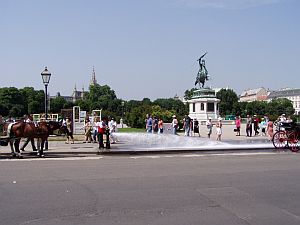
| ||
| Improvised drinking trough for horses - Vienna |
So, one day to discover Vienna. It was a very hot day, with more than 30 degrees Celsius and merciless sunshine. Some of the biggest sights, such as the Stephansdom or the Votivkirche, were in scaffolds, which didn't keep us away from running up the spiral stairs of the dome to the observation platform. The Hofburg, the Opera etc. were interesting too, and there are thousands of good reasons why Vienna is so popular with visitors. But personally, I more enjoyed the rather normal, residential districts like the area around the Hundertwasser museum, or the two giant flak towers, which they didn't manage to blast after the war because they were too massive, the lovely designed power plant next to Franz-Josephs terminal and so on. As a German, it's also fascinating to see how difficult it can be to get by with "standard" German. At one point, I wanted to pull a 24-hours ticket for € 5. Someone approached from behind and told me, that he could give me his ticket for € 2 - that would be valid on some days of your choice, and he already stamped it for this day. Sounds complicated? Indeed, especially when it's explained in the Viennese dialect. However, the deal was perfect after some discussing. Anyway - Vienna is an eclectiv city and shouldn't be missed when travelling around Europe.
The train to Belgrade left the Westbahnhof (bahnhof = train station) at 8 pm sharp. Although it was the middle of July, there weren't many passengers - at least not in the sleeper. But the conductors were clever - they put the few passengers in the sleeper in one compartment so that they wouldn't have to clean the other compartments. And so I found myself sitting around with a family of five Serbs, whilst all the other compartments were empty and locked. The family was very nice, but I felt like the family could do better without me, and so I asked the don of the conductors whether it would be ok to have another compartment. It was ok, and so I had a compartment for my own. And I could stay there all the way to Belgrade, I was told. I was surprised by the amiability - after all the experiences I had with conductors. And so we headed to Budapest. Things changed drastically there: Suddenly, hords of backpackers rushed the train. To explain the popularity of this train - it had through carriages to Sofia (Bulgaria) and Bucharest (Romania). The door to my compartment swung open, and a goggle-eyed young female backpacker, her backpack was almost larger than her, entered the compartment, asking if there's still space. There was plenty of space. And I spluttered "Well, yes", but at that moment, the conductor already rushed in and drove her and the rest away. Some of them asked if they could pay the sleeper fee to stay there - they weren't allowed to. And so, the regular carriages were extremely packed, while the sleeper was still empty. Spending a day from Budapest to Sofia in the aisle of a packed train - as I mentioned before, € 13 can be a good investment (but I have to admit - I don't regret the countless hours I spent in the aisle of various trains).
Day 3: Belgrade → Novi Pazar
Unfortunately, the train reached the border at half past two in the night. And so first Hungarian border guards went through all the compartments. Half an hour later, when everyone almost dozed away again, their Serbian colleagues followed. At 6:45 in the morning, the train arrived in Belgrade. Very few backpackers, less then a dozen, left the train here - the Serbian capital still doesn't seem to be very popular with travelers. I knew the train station and the area around well from my last trip two years ago, and went straight ahead for the first cafe to sip a Turkish coffee. Soon after, I headed for the bus terminal next to the train station. There were still no ATM's around, but this time I knew about it and carried enough cash. At the counter, I asked for a bus to Novi Pazar. "Pol'devet?" (half past eight?) was the answer. Good timing. That left me with just enough time to have a burek breakfast and another coffee before boarding the bus.
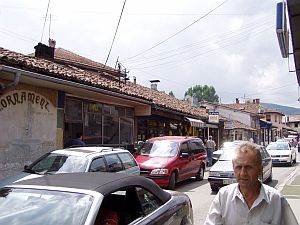
| ||
| Narrow lanes, too many cars, old houses: Novi Pazar |
The bus stopped shortly at the cockroach infested bus terminal of Kragujevac, before it moved ahead westwards direction Kraljevo. The scenery after Kraljevo can only be described as spectacular. Hills turned into steep mountains, calm rivers into wild streams, dilapidated industrial complexes into fortresses towering high above the narrow gorges. Naturally, the bus went on much slower now, but this meant more time to enjoy the scenery. After almost exactly five hours, we reached Novi Pazar. The bus was to continue to another town, but suddenly everyone was told that the bus is broken, and so everyone had to get out.
That was just fine with me - Novi Pazar was the place I wanted to go. As soon as I arrived, I went to the ticket counter and asked for an onward ticket to Prishtina in Kosovo. I chose a bus that would leave around noon the next day. The first thing I noticed in Novi Pazar was the bad air, caused by the traffic and the fact that it lies in a valley. The traffic was a nightmare - too many cars, most of them rather old. After a short walk, I ended up in the city centre und started looking for accommodation. The most eye-catching hotel in the centre proved to be the cheapest. The architecture was fascinatingly ugly, but ugly in an almost interesting way.
I had 24 hours to spend in this town, which offered a unique mixture of rotten concrete buildings and Turkish bazaar atmosphere with several minarets, the two different worlds divided by a small river. The nightlife, which included the sound of the prayers from the muezzins, was amazingly vibrant. I hadn't heard that for a long time - I almost missed that. Somehow I was flabbergasted - I didn't expect to find such a place - rather oriental and heavily influenced by its muslim inhabitants - in Serbia, outside the Kosovo. I finished the day in the surprisingly cool hotel room with a good book and Serbian beer, enjoying Serbian traditional music, which came from a wedding ceremony in the hotel restaurant.
Relevant Links: →Serbia | →Belgrade | →Novi Pazar
Day 4: Novi Pazar → Prishtina → Prizren
There was a lot of time until noon. Without a map or an idea where to go, I first strolled through the old, oriental part of town and kept on walking south. The area wasn't really interesting, and so I walked up one of the mountains surrounding the town. Novi Pazar is quite large, and the mountains to the west are really high - after finding to this conclusion, I started to walk back. This time I took the shortest way, and suddenly ended up in the backyard of someone's home, with all the doors left ajar. I considered myself happy that no one noticed me - they'd be surprised to find a foreigner suddenly standing in their backyard. After a quick lunch, I headed to the bus station. I still had some time left, so I ordered a Turkish coffee. The owner of the café was fluent in German, and so we started a conversation. I had been working in Germany illegally, which explained his language skills. Before that, he was working as a policeman, but since he was a muslim, he was fired without a particular reason after the first war. Soon after that war in neighbouring Bosnia, countless Bosnian refugees flooded the town. After the second war, many thousand refugees came from the opposite direction - the Kosovo. He told me a lot about the problems and tension in the town. Yes, the conflict between the two main religions in the area - Islam and Christendom - is still going on, and he was very concerned about the future of the town and the area. At the end he sounded very frustated - his only comment was "C'est la vie".
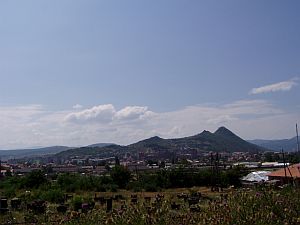
| ||
| A view on (Kosovska) Mitrovica |
Everything changed after we passed Mitrovica. Suddenly, everything looked brighter and much more modern. Everything was in Albanian only - except for the town signs, which were bilingual. Here and there I spotted some recently burnt down houses - guess who was living there. Traffic was heavy, and among the usual cars and trucks were many KFOR vehicles - sporting Swedish, Spanish and many other flags. We already entered the Kosovo Polje, a long and wide valley, and so we moved much faster than before. After around three hours, we already approached Prishtina, the capital of the Kosovo. The outskirts were marked by modern, brightly coloured apartment blocks. The town didn't look very promising, and since I arrived faster than I initially expected, I decided to not stay in Prishtina but to move a little bit more ahead - to Prizren, which I heard is a beautiful town. The fact that the bus terminal lies far outside the centre of Prishtina made the decision even easier.
There was no lack of buses to Prizren - every 10 to 15 minutes was a departure. While I was thinking about which bus to take, a driver approached and urged me to go this bus - he would leave in 5 minutes. That was the first moment when I noticed that the Albanian word for "Thank you" is not so easy to remember: "Faleminderit". There was no other word I could associate this word with. Albanian is indeed completely different to every other language in the area. This time, the bus was very modern and equipped with VCR, air conditioning and the like. Wherever I looked - new companies and petrol stations just mushroomed around the area. Additionally, countless new memorials lined up along the street - easy to distinguish because of the large Albanian flag waving high above the memorials. Not only once I saw convoys of cars, probably heading to a wedding or coming from there. At least one of the cars was definitely decorated with the distinctive red Albanian flag with its double-headed eagle. What energy has been unleashed here! The place seemed to be a huge party. And how much money was there involved! What a contrast to the poor, Serbian villages in the north - and Serbia itself as it is now!
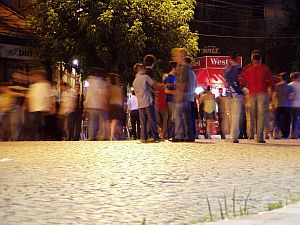
| ||
| Lots of nightlife going on in Prizren |
Due to the lack of alternatives I paid the ten Euro and started walking to the town centre. The first thing I noticed there was the beautiful castle ruin on the top of a hill. The second thing I noticed right after that was a completely destroyed district right below the castle - it looked like it was looted and burnt down very recently. One didn't need to be a Kosovo expert to understand who lived there before that happened. The destroyed district is right between the town centre and the castle - so how is it possible to get to the hilltop?
There were two German KFOR soldiers standing on the central bridge, beleaguered by local girls who wanted to take a picture with them. Their mission seemed to be a tough one... To make their mission more meaningful, I asked the two how I can get to the fortress. Their answer was that it would be possible, yes, but not via the burnt down church halfway. Since they didn't know the exact way to go, one of the two tried to activate his walkie-talkie, but it didn't work. Well done. I gave it another try, assuming that they might know Prizren better then me, and asked if they know where I could find a hotel. One shook his head, the other one said "how should I know" and that was it. I turned around and walked the direction most people seem to walk. After twenty metres or so, I found myself next to two hotels.
Checking in was done in no time at all, and it was even cheaper then expected. The guy at the reception spoke fluent German, and I spent a lot of time talking with him about the town and the Kosovo. Yes, the fact that the Serbian district was burnt down is a shame, especially since it happens after the retreat of the Serbian army - when peace already had substituted war. But he ensured me, that the people who looted and destroyed the houses where definitely from outside the town. After leaving my luggage in the room, I left the hotel to get an espresso after all the hours on the bus. As soon as I sat down in the café, someone talked to me in German. Countless Kosovarians and Albanians spent a long time in Germany - during and after the war - and so German is by far the most common foreign language in Kosovo. I started to like the atmosphere of this place - especially after nightfall. It was summer and still warm outside. Virtually everyone seemed to be in the streets, strolling around or sitting in one of the many street cafés. All of them were bursting with people - mostly young people. But it was interesting to see that there were many more men then women. However, the entire city centre seemed to turn into a huge party area at night. Which was somehow unexpected.
Relevant Links: →Serbia | →Novi Pazar | →Prizen & the Kosovo |
Day 5: Prizren → Kukës
The night before I had another long chat with the receptionist. He asked me where I would go next - and I answered "Kukës". I asked him then if he knows that place and whether there's a hotel or something similar. But no, he had never been to Albania and he added that he doesn't have the intention to change that. He started to talk about the "brothers and sisters" in Albania and it didn't sound very well. He described them as underdeveloped, with many criminals among them making shady business in Kosovo. So much about the asumption that Kosovo, sorry, I mean Kosova, might unite with Albania in future - a rumour that could often be heard, but only abroad.
I had the whole day left for Prizren, since my bus would leave at 9 pm. I tried to walk up the hill to the fortress. The first attempt ended in front of barbed wire and a warning sign by the KFOR administration. So I had to look for another way. After a while I ended up at a burnt down church - the one the soldiers yesterday told me not to go to. The ruin was turned into an observation post by the German army. I ignored them and they ignored me, and so I continued walking along the barbed wire - behind that the badly destroyed Serb quarter. After I while I reached the fortress, which appeared to be larger and more damaged as I thought when I saw it from the town. However, the view from there over the town and all the up to 2,500 m high mountains around was stunning and well worth the effort.
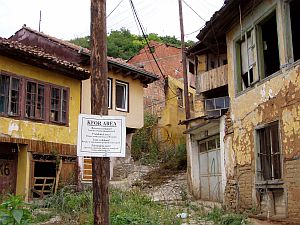
| ||
| Looks like off-limit for the moment... |
Now that I thought about hitchhiking, I got ambitious. Get post cards at the kiosk. Buy stamps at the post office. Have a coffee, write some post cards. Write a short email to let at least one person know what I'm up to (so far, no one really knew where and how I was traveling this time). I didn't need a lunch, because the dinner the day before was much more then expected. I strolled through an old district of Prizren, along the river, until I saw a crossroad, with one of the road signs saying "Tirana". I walked up the dusty road towards the border. Traffic became less and less, which wasn't a good sign. And most of the traffic was army vehicles, one of them sporting the Bavarian flag. Albanian cars were easy to distinguish - they have a red square on their number plates. Unfortunately, there were only very few of them on road. After an half an hour walk or so, I arrived at the city limits sign, where I looked for a good place where I could see the cars (and they could see me) and where I would have some protection from the mercilessly shining sun. I flashed my map, on which it said in large letters "Shqipëria" (Albania). The second vehicle that passed me, stopped. It was a very old Mercedes Benz. I asked "Kukës?" and he nodded. And speeded away as soon as I got in. On the way, he waved to several people working on the fields, explaining that they were his family. Although he couldn't speak any German or English - and I couldn't speak any Albanian, we communicated somehow. I mentioned that I would later continue to Tirana, which he commented with "Ah, Hongkong! Hongkong e shqipërisë" (the Albanian Hongkong) or something like that. If that wasn't a clear case of exaggeration.
It took less than half an hour to get to the border. The driver stopped in front of the UN checkpoint, bid me farewell and went back the way we were coming from. Now I got it. He wasn't going to Kukës at all - he was just so nice to drive me to the border. Among the staff at the UN checkpoint was an Albanian policeman. He asked me where I would like to go. I answered, he nodded and went to the car that stood in front of us. Its number plate said "KS", which means it was registered in Kukës. The policeman had a short chat with the driver - and waved to me. That was my next ride. How simple was that. I went in, said hello, the driver and his friend said hello and we headed off to the Albanian side of the checkpoint. Upon arrival, foreigners have to pay around € 10 in Albania (although the price varies, according to the nationality). But there seemed to be a problem. The guard explained "We run out of receipts. Do you, well, insist on a receipt for the fee?". I didn't want to let the two Albanians in the car wait, so I had no choice and said "No, not really, as long as you stamp my passport properly". Whatever happened to the € 10 I left there... I got my washy stamp in my passport (without I would have been in trouble when I leave the country) and that was it. The car was an old jeep. The driver and a very old man sat in the front of the car, I was sitting behind them. They offered me a cigarette, which I happily accepted. That was a mistake. 5 minutes later they offered the next, and there was no way to refuse. This went on all the way to Kukes - of course I offered them cigarettes, too, and of course they happily accepted - but there was no way of having a 5 minute cigarette break in its literal meaning. The street became narrower and less well maintained than on the other side of the border. We passed a huge dam and countless small, often dilapidated one-person-bunker lining up on both sides of the street. "Enver Hoxha! Jugoslavija! Albania! Boom Boom!" said the driver and the old man at the same time, forming imaginery rifles with their hands. They also left no doubt about their point of view towards communism: Appearantly, they didn't like it very much.
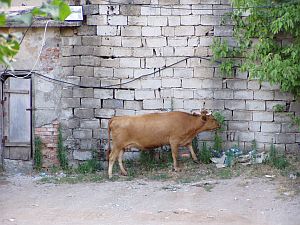
| ||
| There seem to be as many cows as Mercedes Benz in Kukes |
So I started walking around - without a clue where to go and where to stay. After a while, I noticed a sign saying "Bar, Restaurant + Hotel Amerika: 200 m". The place was well hidden in a rundown, drab residential area. It took a while to find the place, but I was astouned when I entered: An oasis in the desert. A fata morgana. A new, small building, with fountains inside, tons of plants and knickknack. The restaurant was hypermodern and spotless clean. The entire building was air conditioned. Soon I found the manager. Better, he found me. Price for a room? € 30. There didn't seem to be a way around it. And since there was no other place to stay around, so I decided to stay. He led me to my room. Large. Bright. Spacious. Marble-tiled bathroom with BD. Air condition. Cable TV. Refrigerator. Not in my wildest dreams would I have expected a place like this in the countryside of Albania. I felt somewhat uneasy to stay in such a luxurious place. This wasn't the thing I was looking for, but it wasn't the situation to be picky.
I gave him a € 50 bill and asked him to give me the change in the local currency, Leke. And so I got 2,400 Leke. He almost forgot to take the € 20 for the Leke. The following walk through the town was short. The town itself was a dead place, drab and frustrating. The landscape however was more than spectacular. Below the town a huge dam, above the town large, massive mountains. Strange, but 80% of all cars seemed to be Mercedes Benz. Here and there, I found a relatively new café - all of them serving decent espresso. But that was about it - there was nothing more in this town.
In the evening, I finally decided to eat something. The first time this day. Baked lamb sounds delicious and € 3 for a whole leg was more than reasonable. There weren't many guests in the restaurant, and so I soon noticed the only other foreigner around - an Englishman working for the Food-for-Work program, who, naturally, knew the situation in Albania very well.
Day 6: Kukës → Tiranë
I was traveling with my mobile - not to make calls but simply to have an alarm clock. But it wasn't of much use this day. My cerebellum knew that I was on holiday, making me ignore the usually annoying alarm sound. And so I woke up at quarter to nine, and my bus to Tirana was about to leave at nine. Maybe there was a small chance to still catch the bus. But I didn't feel like having a day-long bus ride without having a coffee and some free time before. After a long shower and a double espresso I asked the manager if you knows about alternatives to the bus. A taxi would set me back 4,000 Leke, a shared taxi 1,500 Leke, he answered. I hadn't enough Albanian money, so I asked him if he would be so kind to change money again. Since there was no single bank open, I simply had to trust him when he exchanged some money at an exchange rate of 120 Leke for one Euro. Later on in Tirana, I noticed that this exchange rate was more than correct.
He suddenly invited me to his jeep and drove me to the centre. To a place, where shared taxis usually wait for passengers. On the way there, he stopped at an older Mercedes Benz. The driver seemed to be a family member (however you define family in Albania), at least this was my impression.
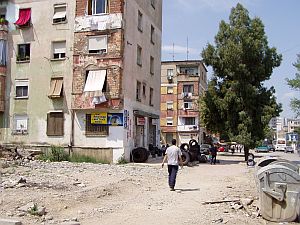
| ||
| More then typical residential area in Tirana |
It went on like this for hours. Climbing bleak mountains, descending again. Sharp turn to the left, sharp turn to the right. Oops, there was large truck behind that curve - that was close. How'd you know. Descending again. Climbing again. A completely rugged, but yet incredibly wide and open landscape. Most of the time, clouds were much closer than the bottom of the valley right below the street. The driver was obviously used to this area and extremely skillful. The street was mostly rather narrow and completely lacked crash barriers, that could prevent someone from falling more than 500 metres deep to the ground, but apart from that the quality of the road was fairly decent. I noticed the complete absence of tunnels - even in Central Asia, they definitely would have blown some tunnels into the mountains on a road like this to cut it short. I was wondering how long it would take by bus, considering all the serpentines. To Tirana, it's around 200 km overland - half of that distance is completely in serpentines. Later on, one Albanian man told me that it taks 10 to 12 hours by bus. With a car, it took us slightly less than 6 hours.
We stopped two times. The first time, when we had passed the most difficult part of the route, to grab a lunch at a small, but very clean restaurant. Another guest there soon came over to our place and started talking to me in German. He seemed to be very nice. He offered me to give me a ride to the capital - his car had a CC (consular corps) number plate, but he was Albanian. I might have accepted his offer, but it wouldn't have been fair towards to ride I was already enjoying. I was asked what I would like to fancy for lunch. Since there was no menu, I quickly answered Qofte (similar to the Turkish Köfte, meat balls). As far as I understood, this was part of the Albanian diet staple and available everywhere. Except for that place. The cook dragged me into his "kitchen" and opened a large fridge. There, he pointed at a pile of meat and made some grunting noises. I see, pork. The driver and I ordered a beer to join the food and soon after that we went on.
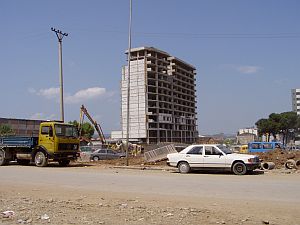
| ||
| Under construction? Or just demolished? Can't tell. |
While it was cool and pleasant in the mountains, it was unbearably hot in the plain. From the barracks, we went to a modern asphalt road, driving straight ahead for a very long time. While in the mountains, I felt secure and comfortable with the driver, but not here in the plains - he passed cars in situations where no one else would dare, raising lots of outraged honking and curses. But somehow he had a very good sense when it came to speed cameras. And there were at least four of them on a distance of around 100 km. We speeded straight southwards to the capital Tirana in a small plain between the sea and the mountains. Tirana started with sprawling outskirts, obviously created without the slightest idea of urban planning, and homicidal traffic.
On the first look, Tirana didn't look very promising. In the internet, I had read about a newly established hostel. Although there was no sign telling that this would be the hostel whatsoever, I could find quite easily. The hostel occupied a beautiful mansion. Three young Albanians, very much resembling students, opened the door. I asked if there was still a bed left. Obviously yes. The hostel opened only three weeks ago, and besides me there was only one guest - a guy from Finland. He had a dormitory for himself and I got one for myself. Since it was already 6 pm, I left the hostel as soon as I put down my luggage. It didn't take long to get an idea of the town centre, since it is rather compact... and not extraordinarily compelling. But the nightlife around the entertainment district Blloku was deeply impressive. All those stylish young women, some of them tending to exhibitionism, made me forget where I was. What a contrast to the rest of the country.
I had read about a famous Albanian firewater, made of mulberries. I never had something like that, so I thought that this might be a good time to try some. So I ordered one, and the waiter got me a small glas filled with a somewhat greenish liquid. After putting it on the table, he only moved 2, 3 metres away, remaining there and watching me. I didn't know why he would do that, but I got it after the first sip. This firewater had around 80% and was breathtaking, indeed.
Day 7: Tiranë → Shkodër
This day I wanted to move to Shodër in the north of the country - located at the large lake with the same name. I could choose between buses and trains. I'd read many bad things about Albanian trains, so I was eager to find out about it by myself. And the distance between the capital and Shkoder was just right for trying it. So I slowly walked to the train station, which can't be identified as such from outside. Inside, I soon found the handwritten timetable (for the entire country) - and I noticed that there were only two trains a day. One was already gone, the other one would depart in a couple of hours. And so I had no other choice but to take the bus. I walked to a large square, which was actually a huge building pit, surrounded by pure traffic chaos. Time to try out some of the recently learned vocabulary: "Më falni, ku ndalen autobusët për në Shkodër?" (Excuse me, where do buses for Shkoder leave?). A smile, followed by a qualified answer was the result. Albania is no exception: Try to use some vocabulary in the local language and you'll be loved.
There were no buses actually, but microbuses only. One of them had a number plate from Shkoder. I asked the driver "Shkoder?", and he shook his head. Which means yes in Albania. I walked in and a few minutes later he drove off. That was good timing. The first leg was the same as the day before when I came to the capital - straight to the north. And there were still four speed cameras, all of them mobile. After all, it took only two hours until we arrived in the centre of Shkoder.
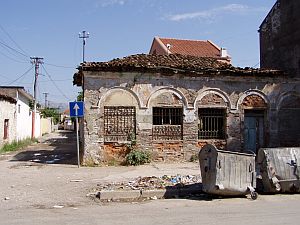
| ||
| Not much is left of Skodra's glory days |
Minutes later I left the hotel, first to grab some lunch. A very thin dough, rolled, filled with some meat, french fries and some vegetables. Next, I went to an internet cafe to let some people know about my whereabouts. I definitely wanted to visit the fortress I saw from my hotel room. But the heat of the afternoon was not the best time to go there, since the fortress is a quite outside the centre. And so I first walked through the district north of the central square - a very lovely old street with numerous small stores. Indeed, this area somehow looked rather Dalmatian-Venetian than Albanian or Ottoman. But after walking for a while, I ended up in a rundown quarter full of waste and countless citizens desperately trying to sell something. Everything. One thing was for sure: Shkoder is much poorer than the capital. Even poorer than Kukës and all the other towns I came across so far in Albania.
The sun was already quite low at 6 pm - time to move to the fortress. I walked along the dusty main road southwards to a large hill, climbing a steep path afterwards. On my way to the fortress, I met to children - a 11 year old girl and her three years old brother. They asked for "Karamelli!" (I guess that means sweets). Unfortunately, I didn't have anything like that with me. Suddenly, the girl started to say a few things in German. I was very surprised. We had a small chat, after which she wished me good luck. Her brother on the other hand repeatedly demanded "Karamelli!". There weren't really beggars, and so I decided to buy them ice cream on my way back from the fortress. It was still very hot, making the ascend to the fortress a sweaty experience. The ruins of the fortress were well worth the effort, and the view from the hill over the entire town and the lake was just fascinating. What a great place this was. I shared this experience with very few people only - all of them seemed to be Albanian. This fortress was definitely a highlight.
On my way back, I could only see sheer poverty along the road. Here and there, I couldn't help but comparing it with certain districts in Mumbai, but of course in a much smaller dimension. Unfortunately, I couldn't find the girl and her little brother. So I slowly walked back to the centre of town to arrive there before nightfall. On the way, I met an old man. He asked me if I'm German. I said yes, and he started to talk in German as well. Once, he was working as a translator, he said. For THE Germans. How come? I asked. "Well, I was working for the Wehrmacht" (Nazi German army) he replaid. So that must have been 60 years ago, but his German was still amazingly well. And so we talked for a while about Albania, the town, history etc. Before I decided to move on - it was already late and I was quite hungry. But it didn't take long until I met another person, and it should take hours to get rid of him.
This time it was a young man who was learning English at that time - and just wanted to chat with a foreigner. Which is completely fine with me. We talked about Germany, Albania and thousands of things. But after a while, I found out about his real intention. He wanted to get to Germany. At all costs. And he told me that he tried to get there already - illegally, until they got him near Milan. He asked me if I couldn't help him. Please, please! I told him that I would move to another country by myself the next month, so I won't be in Germany after that. And I told him, that there are basically only two different ways to stay in Germany legally - either by finding an employer or by marrying someone. And I couldn't offer him either of those. But somehow he was a fascinatingly honest person and he seemed to be very intelligent. So I didn't bother hiding my real thoughts: Why SHOULD I help him? I didn't know him really, so why? And Albania needed him more than Germany - Albania needs ambitious young people, preferably people who can speak English. After a all, it was a very open and moving conversation - partially of course it was very depressing.
At around 10 pm I thought it is about time to say good bye. He insisted on walking with me to my hotel, where he finally went away. The hotel room was hot and sticky, and so I left the hotel after a few minutes again. Looking for a bar or something similar, where I could enjoy a chilled beer in the warm summer night. But: That's mission impossible in Shkoder. Although it was Saturday and not later then a few minutes past ten, almost all places were already closed. The only place I could find was a sports bar, with four different TVs running, showing various sports events. It was possible to place bets there on soccer, horse races and so on. I noticed that already before: Betting on various sports seemed to be extremely popular in poor Shkoder.
Day 8: Shkodër → Ulcinj (Montenegro) → Bar
It was still very early in the morning when I was woken up by an ear-battering noise. A view out of the window explained why - three workers with shovels were busy moving a large mountain of empty glass bottles onto an empty truck. Sunday morning, half past five in Albania. That explained the fact that all bars are closed by ten. I got the strong impression that this is an insane place. But a view on the reddish-blueish morning sky and the silhouette of the mosque at dawn made me want to thank those people down there - it was a stunning view.
I felt that I just arrived in Albania - but I already had to leave again. This trip was definitely too short. I had three days left to get back to Germany from Shkoder - somehow. And Germany was far. As far as I heard, there were microbuses running from the hotel I was staying in to Ulcinj in Montenegro. I also heard that the fare would be € 5 exactly. According to what was written in large letters on a window, the first bus would leave at 9 am, the last one at 5 pm. But first I opted for a double espresso in the hotel restaurant. "For free - because it's Sunday" I was told when I asked for the bill. Wow, in some places you have to pay € 6 for a double espresso - here you get a free hotel room with the espresso. Then I was ready to wait for the minibus. There was already a minibus waiting in front of the hotel - running all the way to Dubrovnik via Podgoritsa in Montenegro. That's a long way for sure. But I wasn't interested in this one and waited for my microbus. But I soon found out that the information in the window was not up to date - after waiting for an hour, I started to ask around and found out that the first bus would leave at 3 pm, the next at 5 pm. It wasn't even 10 am, but I definitely wanted to continue to Montenegro. With a taxi, the fare would be € 20 - for more then 50 km and one border inbetween a decent price. I usually try not to use taxis, but I didn't really see an alternative. I could hitchhike again, sure, but I was already sunburnt and it looked like I would have to walk for miles to get out of the town.
After some haggling, an old taxi driver without any teeth agreed to be my ride. He had a very old Mercedes Benz and was happy as a child whenever I said a word in Albanian - even if it was "Po!" (=yes) only. At least I got him to stop at one of the countless bunkers dotted along the border to take a picture of the weird structures - and of him. What a smile! It didn't take long to get to the border crossing. The taxi driver didn't bother to wait in line and went straight ahead to the checkpoint - triggering a short and hefty discussion with the border guards. But grampa seemed to be very strong - he finally won and we could cross without waiting. Things didn't take much longer on the Montenegrin site - I didn't even have to leave the car.
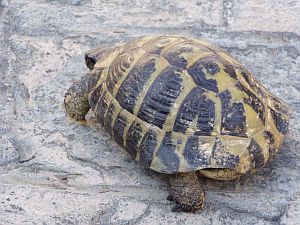
| ||
| Run into me in Bar: XL-tortoise |
The first thing I noticed in Ulcinj was the fact that almost everything was written in Albanian, and many people seem to speak in Albanian accordingly. With the huge difference that everything looked much more modern and beautiful than on the other side of the border. Just for fun, I went to a travel agency, asking for the price of a one way flight ticket to Germany. Who knows - maybe it was cheaper than I thought and I could stay the last three days in Montenegro? But the cheapest one was more than € 300. Well, in that case I rather take the train...
But first I wanted to move on to the city of Bar, although Ulcinj features an attractive historic centre as well. Unfortunately, I didn't have enough time to explore it thoroughly. I walked towards the bus terminal, which seemed to be quite away from the centre of town. Another almost completely toothless taxi driver - must be an occupational disease in this area - stopped next to me, offering me to get me to Bar for € 3 only. As far as I understood, the microbus to Bar would cost € 2, but as far as I looked, I couldn't see any microbuses at all. And so I agreed. I entered his car and he drove around for a while, looking for other passengers. But he could only find one more passenger. When I was in Montenegro for the first time - in 2001 - I noticed the anarchic, suicidal driving style of most drivers in Montenegro. That taxi driver proved to be no exception - I drove as fast as the car would allow. The car didn't have a button to honk, but only to interrupt the honk as it seemed.
The second passenger left the car halfway - and so I was the only one. The driver started talking, saying "Now that it's less passengers than I thought - would € 5 be okay?" I answered "We said 3 and I think we should keep that" (which I said with a mixture of Russian and Serbian). He just smiled and shook my hand. When we arrived, I passed him a € 5 bill, and he handed back the € 2 change without hesitating.
Bar. What a heat. This was no good weather for exploring Bar. It was rather good to go to a bar (sorry - you have to allow this dumb wordplay - it will be the last, I promise). As always, I had no clue where to stay and what to see in the town. So I walked to what seemed to be the centre, and started looking for a travel agent. They sent me to another travel agent. I said what I wanted and the woman there started to make several phone calls. And proudly announced the result: "Private accommodation right at the central square. For € 10! Okay?". "Sure!". She guided me to her car, drove 200 metres and there we were - in front of a common, socialist style apartment block. An older, not very talkative woman opened the door. I put my luggage in the room she showed me and left the apartment immediately. First, to grab some lunch. Then to go to the train station. Unfortunately, all trains to Belgrade on the next day were already sold out. But there were still seats available in the first class. Wow. Never really traveled first class. I had no choice and asked for the price. € 20 was the answer - which is still quite cheap, considering the fact that it's almost 500 km to Belgrade. And so, I bought the ticket and went on - heading for Stari Bar (Old Bar), which is around 5 km away from Bar. This proved to be difficult - due to the lack of information, how to get there, and also due to the lack of public transport.
As many other places along the Montenegrin coast, Stari Bar suffered a heavy tremblor in 1979, flattening wide parts of the town. Stari Bar lies on the top of a hill - and at the foot of a high mountain range. A somewhat wild, genuine historic town completely in ruins in front of a great landscape. I was very excited about the setting and the atmosphere. Adding to the somewhat unique scenery were countless cicada, singing - no, shouting - their monotonous "Meee Meee Meeeeeeeeee", so that I felt like being in Japan again when I closed my eyes. It was simply too hot. 50 metres walk, one sip of water. I needed much water that afternoon. The historic centre of Stari Bar was already declared a museum at that time and very much resembled a fortress. But life in Stari Bar outside the "fortress" was interesting, too, and due to the heat life was extremely slow and relaxed that day. People sat in front of their houses, enjoying some coffee or beer or both, talking about all the world and his wife. I noticed a fat tortoise "running" besides the small main street, fitting well into that afternoon. I was in hopes that the children around wouldn't notice the turtle, but of course they did soon after that and started playing with it. Hope the poor tortoise survived the encounter.
The much newer city of Bar can be... skipped. At least in summer. It's a very touristy place with a fascinatingly ugly main square, entirely made of concrete. Giving it a second thought, that very square was well worth visiting the town. It was already getting dark, and I still had things to do. I knew that I would need to buy a train ticket from Belgrade to Munich - but since I knew that there aren't any ATM's around the train station of Belgrade, I decided that it might be better to withdraw some cash in Bar. Montenegro unilaterally introduced the Euro, making calculations easy. I chose 100 Euro at the ATM and got - one 100 Euro bill. Great. Guess I shouldn't use that at a kiosk.
Relevant Links: →Albania | →Shkodër | →Montenegro | →Bar
Day 9: Bar → Belgrad
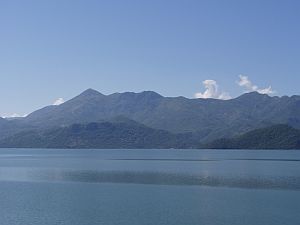
| ||
| Landscape around the large Lake Shkoder |
There, many more passengers rushed the train. Finally, my compartment filled up as well. Three corpulent and quite hairy women joined me - apparently a mother with her two XXL-sized daughters. To put it in other words - it became quite cramped. And so it was about time to look for the restaurant car. On the first view, it looked like they had nothing to sell at all in the dining car. Still, I dared to ask for coffee. They even had some. Another guest, a Montenegrin, suddenly talked to me in Dutch. I answered "Ik spreek bijna geen Nederlands" (I barely speak Dutch - that's one of the very few phrases I could remember) but it was still enough to have a short conversation. Next, I talked with a Serbian passenger, a truck driver, who often works in Germany. And we had a very good conversation with lots of fun. I soon found out why I liked that man - he wasn't polemic at all. He had a very clear mind and the rare ability to judge his own country without any nationalist bullocks. We also talked about the Kosovo. Instead of fulminating against Albanians, he raged about certain Serbs who were once living in the Kosovo, but then selling their houses and land to the Albanians for a lot of money. And now, according to him, those people started to shout "Injustice! We want our land back!". History repeats itself. I heard the same thing many times in Germany before, when West Germans tried to get things they sold once for much money back from East Germany right after the unification.
Thanks to him and the great scenery passing the train window, time passed quickly and it never got boring. The Montenegrins, although at that time still united with Serbia, controlled the passengers at the Montenegrin-Serbian border. The Serbs didn't. And the truck driver was right when he said "Everywhere in Europe, borders vanish. Except for Ex-Yugoslavia - everyone suddenly tries to be on its own". After entering Serbia, the mountains turned into hills. And the hills became smaller and smaller. Before, we passed countless tunnels, making me feel as if I would ride on a subway, but now there was more to see. Shortly before 7 pm, we arrived in Belgrade. First step: Ticket counter, getting a ticket for the next day to Munich. The train would leave at 6 am, the fare was € 94. I decided to stay in the same hotel I stayed already some years ago with my wife. The hotel is right in front of the train station. After putting down my luggage, I went for a walk through the city. Some street hawkers sold suspiciously looking DVD's. They were definitely not originals. I wasn't interested in the latest Hollywood blockbusters - but I remembered a great Serbian-Slovenian-German-French movie called "Black Cat, White Cat". I asked for the movie - and one of the guys actually sold it. For 250 Dinar (exchange rate at that time: € 1 = 80 Dinar). "Because it's an original DVD", the seller said, smiling impishly. With that price, I didn't really care.
Again, I got a little bit lost when I tried to get back to the hotel. Same as years ago. And again, I therefore passed the huge building was completely destroyed by the NATO air raids. Nothing had changed - it looked the same as some years ago. Later on, while chatting with the hotel receptionist, I found out that that very building was once the Ministry of Defence. According to him, someone has already acquired the structure - and wants to turn it into an upmarket hotel. One thing is for sure - there will be a lot to do.
Relevant Links: →Montenegro | →Bar →Serbia | →Bar
Day 10: Belgrade → Zagreb → Ljubljana → Munich
The night finished very early. The train to Munich left already shortly before 6 am. The train was very modern, and less than half of the seats were taken. And the train was air-conditioned. Soon we left New Belgrade and speeded westwards. After a while, a man and a woman entered my compartment. They didn't know about each other but soon started talking. It took only a couple of minutes until a hefty political discussion started between the two. That discussion was about to last until Zagreb, the Croatian capital. I'm sure they didn't expect me to understand their conversation, and it was hard to follow (I don't really speak Serbian, but Russian, which is sufficient to get the main idea), and so they talked quite frankly.
I was a little bit nervous before we arrived at the Serbian border - because of my excursion to the Kosovo. This meant, that I had two Serbian border entry stamps for Serbia and Montenegro, but no exit stamp. Or to put it in other words - according to Serbian law, I had left the country illegally before. However, my passport was already a couple of years old and full of various stamps and seals. At the border, the police fortunately didn't bother to examine my passport from the beginning to the end.
Many small towns and villages in Slavonia (Eastern Croatia) still seemed to be destroyed. While sitting in this modern, comfortable train, it was hard to imagine that this place was the ground of fierce battles - only a few years ago. Hours later, we arrived in Zagreb. Shortly after that, we stopped in the Slovenian capital of Ljubljana, where the compartment filled up with German tourists. It was in the Austrian Alps then, that I saw the first real cloud after ten days of blue sky. One hour later, the clouds even turned into rain. In Salzburg - already quite far away from Belgrade, the train was still on time. However, the German railroad company DIE Bahn managed to organize a 20 minutes delay on the short distance between Salzburg and Munich. No problem - I had 30 minutes time in Munich to get a ticket for the next ride - a night train. So, those 30 minutes turned into 10 minutes - to get the ticket and some food for the last leg of this trip. The next shock came at the ticket counter: The price for a regular ticket on the night train from Munich to Halle was € 74. I should live somewhere near the German border - that would make traveling substantially cheaper. At 5 am the next day, after some 2,000 km and 23 hours on the train (actually more than 30 hours if I include the train from Bar), I finally arrived my apartment. Arriving from a trip that was way too short - but definitely satisfying.
Relevant Links: →Serbia | →Bar | →Croatia | →Zagreb | →Slovenia | →Bar |
©2024 Europe-East.com

 Albania
Albania Travelogue Index
Travelogue Index